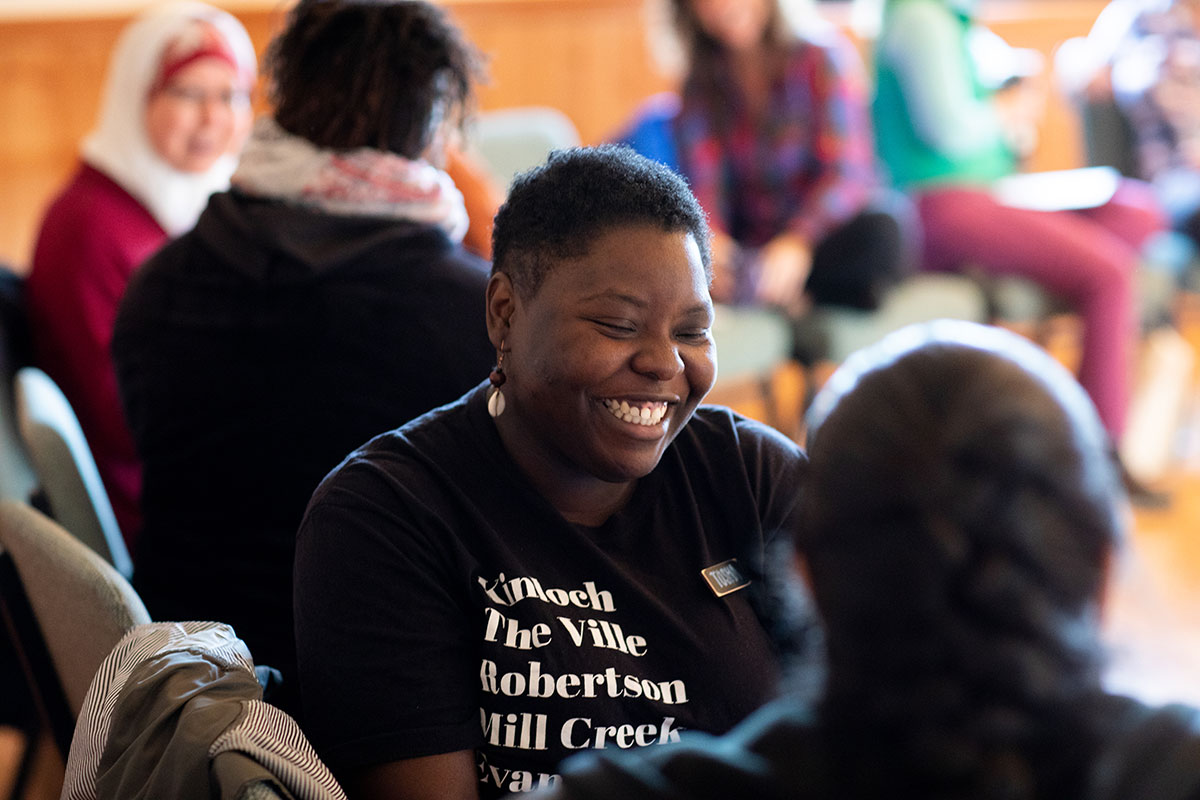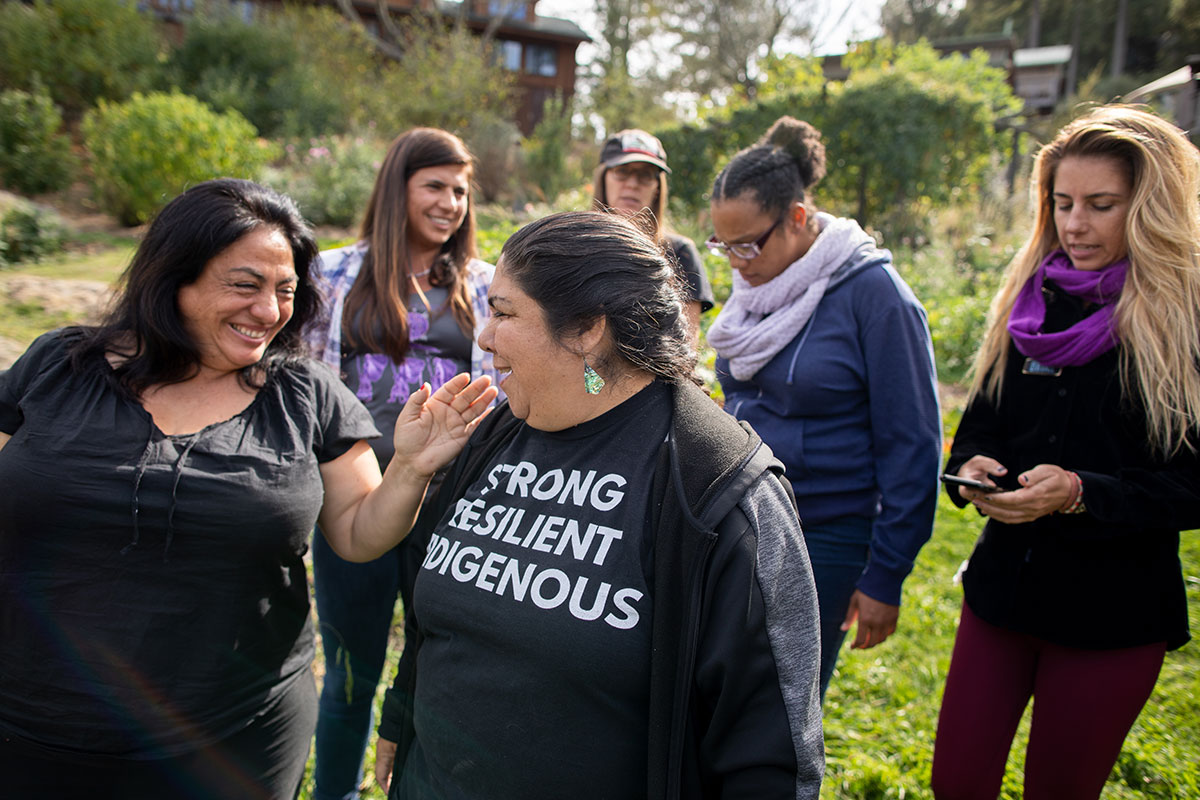Magaly Santos and I both unlatch our charm necklaces and gently set them in a circle of other keepsakes offered by 21 women from around the country. For the opening ceremony of a four-day immersive learning experience, which wrapped a four-month leadership program, we had all brought with us an item representing our work as environmental and social justice activists. Now we are encouraged to tell the story of what brought us into this room in Northern California — a room full of women who are advancing grassroots climate solutions from Alaska to Guam.

Santos’ chain holds a charm with Mother Mary, and mine a butterfly, which we both explain are symbolic of what keeps us motivated to advocate in times of political chaos, human rights abuses, and an intensifying climate crisis. Santos is 16 years old and from a California farming community of mostly immigrants. Many of her friends and relatives are being exposed to a toxic cocktail of pesticides while working in shifting and increasingly difficult climate conditions. In my work as a communicator, I frequently hear the stories of people moving around the world, many of whom are seeking reprieve from droughts, floods, hurricanes, wildfires, and other natural calamities that are all becoming more intense as our world warms. The climate crisis is taking a toll on the economies of their homelands and their livelihoods.
As we make our way around the circle, all 21 participants describe the item they’ve brought. The themes embedded in their explanations strike me as recurring. In telling their own stories, all of the women allude to a bigger, global effort: the fight to save the planet that sustains us, and to secure justice for the communities that are struggling in the face of existential changes to homes and ways of life.
These women — and so many others — have fought passionately, innovated thoughtfully, and lifted up their communities as they tackle their environmental realities. And in many ways, they have been wildly successful. Throughout the accelerator program we hear stories about the betterment of people and places — including from one woman who is notified during our four-day gathering that her city government has adopted a climate action plan. Her organization had been paving the way for this type of policy for years.
Yet, women have not had an equal opportunity to participate in climate policy-making and governance when compared to their male counterparts. According to a 2017 report in Forbes, a minuscule 0.2 percent of philanthropic funds are channeled to women-led environmental solutions. This cultural and systemic under-investment in women on the frontlines stymies their efforts to scale up successful solutions to the global level where they are desperately needed.
In an attempt to address this issue here in the United States, the Sierra Club joined with Women’s Earth Alliance (WEA) last year to launch the US Climate Accelerator program to give women activists working on a range of environmental challenges a catalytic boost. This program builds on the work of WEA, which was founded with the vision that bringing the world’s women together could truly advance a just and sustainable world. For over a decade now, WEA has worked alongside women leaders like Santos, fighting to elevate their knowledge and grassroots solutions.
Both organizations have consistently heard the same needs expressed: Women need increased capacity, better paths for knowledge and information sharing, more funding, improved tools for advocacy, and more robust alliances to fight climate change. Finding a way to make these resources more accessible can provide huge benefits to communities dealing with the very real impacts of the climate crisis.

The four-month accelerator program was designed by team members who have lived through these struggles themselves and want to create a ripple effect of support for women on similar journeys. With their experience and knowledge in mind, the US Climate Accelerator includes skill-building through group and individual sessions. Through many sessions, participants sharpened their lobbying, communications, digital, and fundraising skills. The program wrapped with an in-person immersive session, hosted by the Occidental Arts and Ecology Center, where the participants convened to finalize their project proposals and share their visions with partners and funders.
The first cohort to pass through the program included women who are using data to advance progressive climate policies, teaching urban agriculture methods to their communities facing food insecurity, plugging their neighborhoods into clean and decentralized energy sources, bringing together interfaith Earth stewards, and much more. These are the kinds of solutions that have lasting environmental and societal benefits.
We recognize that women, and women of color in particular, are underrepresented and seldom acknowledged for this work despite being disproportionately affected by climate change and injustice. The truth is that, from Alaska to Louisiana to North Dakota, women are the ones leading on climate adaptation. They’re piloting community clean-energy programs, sustainable disaster-response efforts, and filling the role of community leaders, while at the same time managing to feed and shelter their own families in the aftermath of severe natural calamities.
Learn more about the accelerator program.
The first US Climate Accelerator cohort joins the ranks of women around the world who are building a diverse and just movement of women’s environmental leadership and unleashing solutions that will shape our collective future. And as future cohorts complete the program, in the years to come, the network will continue to grow and strengthen.
Santos, the youngest of the cohort, and Corrina Gould, an accelerator team member and Ohlone leader who taught us about traditional knowledge that has been passed down in her family for centuries, are both planting the seeds we need to fight this existential crisis. Both women are on the frontlines of our changing planet, suffering the damage we continue inflicting on it, but persevering and organizing for environmental justice.
I will never forget their stories. They offer a glimpse of why initiatives like the US Climate Accelerator are necessary as part of our collective effort to build a world that is more equitably confronting the climate crisis.
We don’t have a paywall because, as a nonprofit publication, our mission is to inform, educate and inspire action to protect our living world. Which is why we rely on readers like you for support. If you believe in the work we do, please consider making a tax-deductible year-end donation to our Green Journalism Fund.
DonateGet four issues of the magazine at the discounted rate of $20.